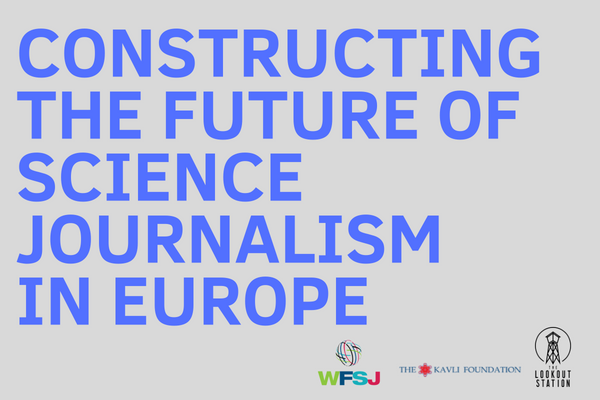
In a nutshell
The first-ever meeting between a select group of 20 international innovative science journalists and change-makers in newsrooms to discuss, explore and envision the future of science journalism in Europe. This one-day meeting will take place on Monday 9 July 2018 at ESOF2018 in Toulouse.
The Exploratory Meeting will gather some of the most influential science/digital journalists in Europe who are looking at the opportunities to advance science reporting in the rapidly-changing media landscape.
We will mix the group with those who have already done interesting, innovative things and science journalists who know their subject and who want to innovate, but have not yet had the chance to try and test ideas around and who would welcome the opportunity to discuss concepts with.
Our Mission
The digital revolution has transformed the way in which people engage with new technologies and information. As this cultural transformation takes shape, the media have gone through dramatic shifts in adapting their business models, building new digital-savvy teams, and creating sustainable editorial strategies. While innovation in journalism is still taking off, trust in media has become an industry-wide challenge. In this climate, evidence-based and science-driven reporting is more important than ever. Science journalism must be on the frontline of media transformation to bring facts, data and evidence to the wider public.
Our Vision
We will build innovative, impactful and sustainable science journalism in Europe. We will empower audiences to improve critical thinking through science-based information and online technology.
Meeting Goals
The main objectives of this meeting are to:
- Explore innovative practices that can benefit science journalism in Europe
- Share best practices and lessons learned among practitioners between the US and Europe
- Convene forward-thinking, creative journalists who want to drive innovation in science journalism in Europe
- Brainstorm ideas and action plans to advance science journalism in Europe
- Develop innovative agendas for science-journalism meetings in Europe incl. KS5 in July 2019
From a long-term perspective, this meeting will act as a starting point to develop a network of journalists committed to building innovative, impactful and sustainable science journalism in Europe.
The Program
10:00-10:20 Welcome by the organizers
10:20-10:40 Icebreaker: Introduction interviews
Part 1: Emerging Best Practices in Science Journalism
This session will highlight some of the emerging best practices of science journalism in Europe and beyond that combines data, immersive storytelling and AI. In total there will be 3 science journalists presenting in this session.
10:40-10:50 Data Storytelling
What are the best practices in science storytelling using data visualization? This session will showcase some of the best recent examples of science-based storytelling using data, such as the interactive description of urban scenarios made by The Guardian and the interactive on the ice melting designed by The New York Times.
Speaker: Elisabetta Tola, Italian Science Journalists Association and Co-founder, Formicablu
10:50-11:00 Immersive Storytelling
Drones, 360 videos and Virtual Reality are the buzzwords in the innovation journalism scenes. This session will highlight some of the science-based stories supported by the Lookout Station including a 360 video on wildfires in Portugal with Euronews, a drone story on the rivers that emerged in Argentina with The Guardian and a 360 video which TASS developed through Lookout360.
Speaker: Olga Dobrovidova, Senior Science Journalist, TASS News Agency (Russia)
11:00-11:10 Artificial Intelligence and Automation
Chatbots and natural language processing – a new wave of AI is reaching science journalism. Could AI give a helping hand to solve some of the issues that science writers have been experiencing? This session explores the world of artificial intelligence and how science journalism can take advantage of the new technology.
Speaker: Mico Tatalovic, Chairman of the Association of British Science Writers
11:10-11:30 Coffee break
Part 2: Pitch Round: Idea Sharing by WFSJ Journalists
In this session, all invited WFSJ will give a 5-min ‘elevator pitch’ to share their story idea they would like to work on. The total number of WFSJ speakers is TBA, minimum 5.
11:30-11:35 Pitch Talk 1
11:35-11:40 Pitch Talk 2
11:40-11:45 Pitch Talk 3
11:45-11:50 Pitch Talk 4
11:50-11:55 Pitch Talk 5
Moderator: tbd
12:00-13:00 Networking lunch
Part 3: Joint Efforts between Science Journalism and Digital Innovation
This session will feature two world-leading newsrooms that combine the joint efforts between science journalism and digital innovation.
13:00-13:30 Spotlight on ProPublica’s ‘Losing Ground’: Engaging with Communities through Data and Investigation
Speaker: Al Shaw, News Applications Developer, ProPublica
13:30-14:00 Spotlight on Connecting Community Engagement and Science Journalism
Speaker: Anna Nagle, Chief Editor, Digital & Engagement, Nature
Part 4: Brainstorm the Future of Science Journalism in Europe
14:00-16:30 Roundtable: agenda for the future of science journalism in Europe
What drives science journalism innovation in Europe? How can we solve some of the challenges by addressing the most pressing issues in the science journalism events and meetings? In this session, the exploration committee members are asked to share specific challenges around advancing science journalism innovation in their own newsrooms and at the European level, followed by break out sessions to explore the topics and develop ideas for the science journalism meetings incl. KS5 agenda. (Chatham house rule applies)
Moderator: Alok Jha, Public Engagement Fellow, Wellcome Trust
End of Program
Meeting organizers
This event is a co-organisation between The World Federation of Science Journalists, The Kavli Foundation, and The Lookout Station